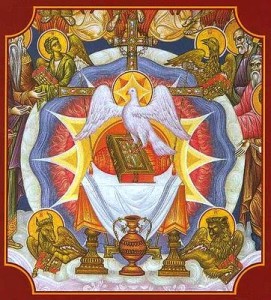by Maurice A. Robinson
 Concluding Observations
Concluding Observations
Every variant unit can be evaluated favorably from a Byzantine-priority perspective, and all units should be carefully examined when attempting to restore the original text. While some examples of Byzantine-priority analysis appear in the present essay, it is impossible within a short study to present a complete or comprehensive discussion of variants. Although an analysis of significant individual variant units can be provided in short studies, a thorough text-critical examination should cover many sequential units within a given portion of text. Most variant units require extended discussion in order to establish the text in a persuasive manner; short summaries often are weakened by a failure to present all the relevant material regarding a variant unit.
The present writer elsewhere has offered detailed examples which illustrate the working principles and conclusions of the Byzantine-priority hypothesis as compared with those of modern eclecticism.
While this essay cannot present a detailed exposition of the Byzantine-priority theory, it does provide an overview of its presuppositions, principles and praxis, demonstrating itself as a legitimate theory under the broad banner of NT textual criticism, and an alternative to modern eclecticism.
The Byzantine-priority hypothesis is far more complex than it may appear; it does not encourage a simplistic eclectic approach nor a narrow theological outlook toward a predetermined result. The final determination of that text remains problematic in all too many situations, despite a primarily externally-based methodology. Absolute certainty in regard to the entire NT text can not be expected, given the evidence as preserved. Under all theories, ca 90% of the original text of the NT is considered established.
Byzantine-priority attempts to extend that quantity, following reasonable principles of internal and external evidence, balanced by historical and transmissional factors.
Byzantine-priority provides no domain or shelter for those unwilling to labor diligently, or for unscholarly individuals whose goal is merely a biased theological perspective or the advocacy of a particular translation. Rather, the theory manifests a compelling and logical perspective which can stand on its own merits. It attempts to explain the evidential data preserved to critical scholarship in the quest toward the goal of establishing the original text of the canonical Greek New Testament.
Byzantine-priority has a methodological consistency which cannot be demonstrated among the modern eclectic alternatives. This consistency derives from an insistence on a primarily documentary theory (following Westcott and Hort). This is coupled with an understanding of internal principles within a transmissional-historical framework. Apart from this essential base, any claim to approach or establish an authoritative form of the original text of the New Testament consistently will fall short.
The problem within modern eclecticism has long been recognized. Colwell declared in 1955,
“The great task of textual criticism for the generation of scholars who are now beginning their work is the rewriting of the history of the text and the recreation of theory.”
Kenneth W. Clark in 1968 stated,
We require a critical history of transmission… Some new angle, some novel experiment must be tried if we would in our time achieve a breakthrough… This is the fundamental need before we may move on to a thorough and systematic revision of the critical text. The remedy we need can only come through a better diagnosis. The true diagnosis will of necessity be a new and different one.
Epp in 1974 declared that “the establishment of the NT text can be achieved only by a reconstruction of the history of that early text… Obviously, doing this is harder than saying it.
Clark and Epp are correct: for the past century, eclecticism has functioned without an integrated history of textual transmission. That its resultant text has no root in any single document, group of documents, or texttype is an unfortunate by-product of its self-imposed methodology. Thoroughgoing eclecticism remains a scholarly endeavor divorced from external considerations; reasoned eclecticism attempts to strike a balance between internal and external criteria. Yet both systems fail precisely at the point of transmissional history: their resultant text remains without consistent documentary support, and represents a piecemeal assemblage comprised of a disparate and unrelated mélange of preferred readings taken from isolated variant units.
At this point Byzantine-priority theory does not fail, but offers a transmissionally legitimate resultant text which is well-supported among the manuscript base underlying the Byzantine Textform.
If modern eclectic theory can secure a niche within NT textual criticism, so much more the Byzantine-priority hypothesis with its insistence upon a solid transmissional base before applying principles of internal and external criticism. Byzantine-priority thus is urged for acceptance as a preferable alternative to modern eclectic theories which ultimately fail to present a transmissionally viable “original” text.
Despite modern eclectic expressions regarding what NT textual criticism “really” needs, modern text-critical thought steadily moves away from the highest ideals and goals. Current eclectic speculation involves heterodox scribes who are claimed to have preserved a more genuine text than the orthodox, as well as a general uncertainty whether the original text can be recovered, or whether any concept of an “original” text can be maintained. The Byzantine-priority position offers a clear theoretical and practical alternative to the pessimistic suppositions of postmodern eclectic subjectivity.
The various eclectic schools continue to flounder without an underlying history of transmission to explain and anchor the hypothetically “best attainable” NT text which they have constructed out of bits and pieces of scattered readings. In the meantime, the Byzantine-priority theory remains well-founded and very much alive, despite the orations and declamations which continue to be uttered against it.
This excellent article is reprinted with permission of TC: A Journal of Biblical Textual Criticism .
© TC: A Journal of Biblical Textual Criticism, 2001.
